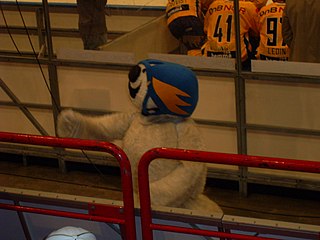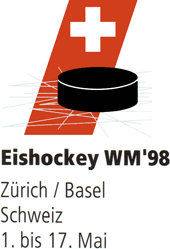The IIHF World Championship Division III are an annual sports event organized by the International Ice Hockey Federation (IIHF). It was the lowest level of the IIHF World Championships until the formation of Division IV for 2020.
The 2008 Men's Ice Hockey World Championships was the 72nd such event hosted by the International Ice Hockey Federation. Teams representing 48 countries participated in four levels of competition. The competition also served as qualification for division placements in the 2009 competition. Russia won the Top Division tournament and became the world champions. In the Division I Championship held in April, Austria and Hungary were promoted to the Championship division, while South Korea and Estonia were demoted to Division II. In the Division II competition, Romania and Australia were promoted, Ireland and New Zealand were relegated to Division III. Greece won the Division III qualification in February, and competed in the Division III competition from March to April. In that competition, North Korea and South Africa were promoted to Division II for 2009.
The 2002 Men's Ice Hockey World Championships were held between 26 April and 11 May 2002 in Gothenburg, Karlstad and Jönköping, Sweden.
The 2001 Men's Ice Hockey World Championships were the 65th such event organized by the International Ice Hockey Federation. 40 teams representing their countries participated in several levels of competition. The competition also served as qualifications for division placements in the 2002 competition.
The 2004 IIHF World U18 Championships were held in Minsk, Belarus. The championships began on April 8, 2004, and finished on April 18, 2004. Games were played at the Ice Palace and Palace sport in Minsk. Russia defeated the United States 3–2 in the final to claim the gold medal, while the Czech Republic defeated Canada 3–2 to capture the bronze medal.
The 1999 Men's Ice Hockey World Championships was the 63rd such event sanctioned by the International Ice Hockey Federation (IIHF). Teams representing 41 countries participated in several levels of competition. The competition also served as qualifications for group placements in the 2000 competition.

The 1995 Men's Ice Hockey World Championships was the 59th such event sanctioned by the International Ice Hockey Federation (IIHF). Teams representing 39 countries participated in several levels of competition. The competition also served as qualifications for group placements in the 1996 competition.

The 1965 Ice Hockey World Championships took place in Hakametsä, Tampere, Finland, 3–15 March. Eight teams took part, each playing each other once. The Soviets became world champions for the fifth time, winning all of their games. This also counted as their ninth European title, with the Czechs finishing second and the Swedes third. For the third straight year Canada finished fourth. The tournament employed new tie-breaking rules, which some believed were supposed to be in place for the Innsbruck Olympics. To decide medals priority would be given to the team who won the head-to-head game, unless they tied, or more than two teams were tied. In those two cases goal differential would be used, but only the goal differential between the top four teams.

The 1997 Men's Ice Hockey World Championships was the 61st such event sanctioned by the International Ice Hockey Federation (IIHF). Teams representing 36 countries participated in several levels of competition, while three other teams competed in an exhibition tournament to gain experience before joining on an official basis in the 1998 competition. The competition also served as qualifications for group placements in the 1998 competition.

The 1994 Men's Ice Hockey World Championships was the 58th such event sanctioned by the International Ice Hockey Federation (IIHF). Teams representing 35 countries participated in several levels of competition, with an additional two national teams failing to advance from a mid-season preliminary qualifying tournament. The competition also served as qualifications for group placements in the 1995 competition.

The 1993 Men's Ice Hockey World Championships was the 57th such event sanctioned by the International Ice Hockey Federation (IIHF). Teams representing 32 countries participated in several levels of competition, with an additional six national teams failing to advance from mid-season preliminary qualifying tournaments. The competition also served as qualifications for group placements in the 1994 competition.
The 1992 Men's Ice Hockey World Championships was the 56th such event sanctioned by the International Ice Hockey Federation (IIHF). Teams representing a record 32 countries participated in several levels of competition. The competition also served as qualifications for group placements in the 1993 competition.

The 1991 Men's Ice Hockey World Championships was the 55th such event sanctioned by the International Ice Hockey Federation (IIHF), and at the same time served as the 66th and last Ice Hockey European Championships. Teams representing 25 countries participated in several levels of competition. The competition also served as qualifications for group placements in the 1992 competition.
The 1990 Men's Ice Hockey World Championships was the 54th such event sanctioned by the International Ice Hockey Federation (IIHF), and at the same time served as the 65th Ice Hockey European Championships. Teams representing 28 countries participated in several levels of competition. The competition also served as qualifications for group placements in the 1991 competition.
The 1999 IIHF Women's World Championships was held between March 8–14, 1999, in Espoo and Vantaa in Finland. Team Canada won their fifth consecutive gold medal at the World Championships defeating the United States. Canada skated to a solid 3–1 victory in the final to take the gold with a solid performance that saw them winning all five games.
The 1961 Ice Hockey World Championships was the 28th edition of the Ice Hockey World Championships. The tournament was held in Geneva and Lausanne, Switzerland from 1 to 12 March 1961. The games were played outdoors on a frozen pool. A glare made it hard for players to see well, however photographers were able to get aerial pictures from the diving board. Canada, represented by the Trail Smoke Eaters, won their nineteenth international title. It would be 33 years before Canada won another World Championship. By beating out the Soviets for the Silver, the Czechoslovaks won their tenth European title. The final day was marred by political controversy when Willi Daume, president of West Germany hockey, forbade his team to take the ice against East Germany to avoid the possibility of honouring the East German's new flag.

The 2006 IIHF World Championship was held in between 5–21 May 2006 in Riga, Latvia. It was the 70th annual event, and was run by the International Ice Hockey Federation (IIHF).

The 1999 IIHF World Championship was held in Oslo, Hamar and Lillehammer in Norway from 1 to 16 May. It was the top tier of the men's championships for that year.

The 1998 IIHF World Championship was held in Switzerland from 1–17 May 1998. The format expanded to 16 teams for the first time. The teams were divided into four groups of four with the top two teams in each advancing to the next round. The two groups of four then played a round robin with the top two teams in each moving on to the semi-finals. The semi-finals were a two-game total goals for series as was the final.

The 2014 World Junior Ice Hockey Championships was the 38th edition of the Ice Hockey World Junior Championship (WJHC), hosted in Malmö, Sweden. The 13,700-seat Malmö Arena was the main venue, with the smaller Malmö Isstadion the secondary venue. It began on December 26, 2013, and ended with the gold medal game on January 5, 2014.
 Austria (2nd, Qualification Tournament)
Austria (2nd, Qualification Tournament) Belarus (Promoted from Group B)
Belarus (Promoted from Group B) Canada
Canada  Czech Republic
Czech Republic  Finland
Finland  France
France  Germany
Germany  Italy
Italy  Japan (Far East Qualifier)
Japan (Far East Qualifier) Kazakhstan (1st, Qualification Tournament)
Kazakhstan (1st, Qualification Tournament) Latvia
Latvia  Russia
Russia  Slovakia
Slovakia  Sweden
Sweden  Switzerland (Host)
Switzerland (Host) United States
United States 








